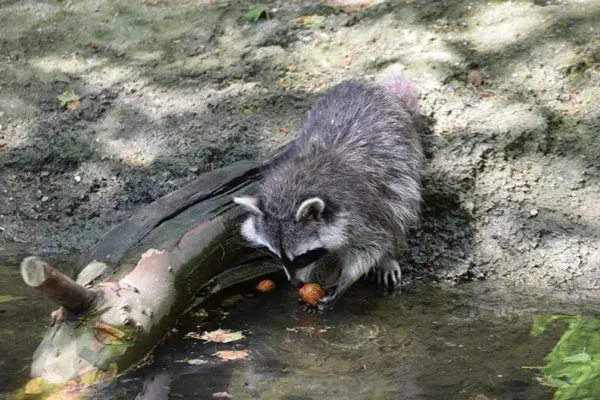In the animal world, some creatures have some very strange behaviors, and one of those that we find really fascinating is the raccoon. Raccoons are sometimes seen “washing” their food before eating it! To us, this may seem quite strange and out of place.
Why do they do it? Are they really washing their food In the sense of, can we compare what they are doing to the way we wash our hands before dinner?
Raccoons do appear like humans when it comes to eating their food though. They use their paws and claws as tools to get at that delicious treat inside those hard shells; such as nuts, acorns, etc. But why dunk food in the water?
This is a question that many people have asked for many years – and though it might seem like a silly question, the answer to this problem could help us understand more about raccoons and their behavior. This article will explore the raccoon’s puzzling behavior and hopefully give you a better idea of why raccoons do what they do.

The Raccoon’s Eating Habit
Raccoons are peculiar animals that are native to North America. They have a very distinct appearance with their black “bandit” mask across and around the eyes, it being one of their most noticeable features.
But what is most interesting about raccoons is not just how they look but also how they eat, or at least their habit of washing their food. Raccoons do wet their food in water before eating. This has been a topic of debate for many years and scientists and researchers have been trying to explain why raccoons do what they do, but none of them can agree on the same answer.
Until a 1986 study was published in the Somatosensory Research Journal. This study brought to light the reason why raccoons dunk their food in water before eating – and the answer isn’t what you’re expecting!
The Washing Bear
The raccoon’s scientific name is Procyon lotor. It means “washing bear”. This is a very fitting name for this animal because of their interesting behavior: Their seemingly strange habit of washing their food.
There have been many theories about why they do this and for a long time, many people believed that the raccoons are just washing away the sand and grit from their food before eating it, but there is a problem with this theory: Raccoons live in many different areas, including forested wetlands and coastal marshes. They can’t be getting much sand or grit there!
Some scientists have also proposed that they are washing because they don’t produce enough saliva and they’re just trying to wet the food and make it more palatable. This theory has also been refuted and proven incorrect and ever since our fascination with raccoons was sparked, we have been trying to figure out why they do what they do.

Dousing
The raccoon’s behavior has puzzled many people enough that scientists have conducted studies to understand this behavior – And as it turns out, they do not actually wash their food to clean it. What they’re doing is what scientists called dousing.
When raccoons dunk their food in the water and, seemingly wash it, they are really just making their paws more sensitive. Water increases the tactile nerve responsiveness of their paws and this allows them to learn more about the thing that they are holding and eating. This lets them feel the texture of their food more and makes it easier for them to pick out what they want or don’t want in their mouths.
Dousing provides extra sensory input and helps them understand more about the food item that is in their hands. It helps them to understand the shape, size, and texture better because the majority of their food is made up of small things that are hard to see in the dark.
Essentially, this is how they “see” their food. By putting it into the water, they can determine what it is much better than if they were to just grab it with their paws and then eat right away.
Raccoons, being nocturnal creatures, have lived in the dark most of the time and they rely on their other senses, especially touch so that they can make sense of the objects around them. Dousing has been the raccoon’s way to explore their food and find out what it is before eating it, much like how we use our hands when exploring an object in front of us.

The Raccoon’s Front Paws
Raccoons have exceptionally sensitive front paws. Their five long fingers are perfect for feeling and exploring the world around them. Their hand is so sensitive that they have five times more mechanoreceptors than most mammals! This is an essential adaptation that allows them to be successful at what they do.
The raccoon’s front paws are their main tools for exploration and making sense of the world around them. Their exceptionally sensitive touch is used to its advantage when searching for food or anything else in their environment, especially at night time where vision is much less reliable than a sense of touch.
Water, as mentioned before, increases the sensitivity of their paws. The raccoon’s front paw has many sensitive nerve endings that help them learn more about the item they are holding so they can make better decisions on what they are putting in their mouths.
Scientists believe that Dousing might also help the raccoon identify whether their food is good for eating or not, especially when it comes to plants and insects. They can even use this technique underwater in search of clams or crayfish!
As you can see, dousing is an important part of the lifestyle of a raccoon and it allows them to gather information about potential foods or anything else they may come across. It’s no wonder why so many people find this behavior interesting and wonderful!

Foraging for Food
Wild raccoons are omnivores, meaning that raccoons eat almost anything – including plants, fruits, nuts, and insects. They’re also opportunistic eaters so they will try to take advantage of available sources of food whenever possible! This includes garbage cans, pet food, frogs, small animals, and more.
And since they are nocturnal animals, their visual senses are not as strong and they rely mostly on their other senses – including touch – to make up for it. Raccoons forage at night, which means that they are moving around hunting or engaging in food thievery in the dark, this is where their sensitive paws come in handy.
Their front paws have this special adaptation that allows them to perceive the world around them and gather all sorts of information about what’s in front of them so they can make better decisions about their daily meals.
Conclusion
In closing, raccoons do not really wash their food in the human sense of the word “wash”. They don’t do it to remove germs or bacteria and they don’t do it to get rid of dirt.
They douse it to give them better sensory information so that they can determine what kind of food is being held and eaten. This helps raccoons a lot because most of their diet consists of small, hard-to-see items that would be easier to identify if their paws are wet.

Raccoons have evolved this behavior over time because foraging after dark means that they cannot rely on their visual senses alone. They have created a way to gather information about their food through touch and water so that they can use this knowledge to make smarter decisions on what they will be putting into their mouths.
So next time you see a raccoon dunking his meal into the water before eating it, don’t think that they’re being germaphobes or anything, they are simply trying to learn more about the thing that they are going to eat!
There you have it. We hope that we answered your question about whether or not raccoons do food washing and provide you with some information on the topic! What’s your opinion? Are you fascinated by these wonderful creatures too? Let us know! And if you are ever in the market for raccoon pest control, you know who to call!
Originally published on https://aaacwildliferemoval.com/blog/raccoons/do-raccoons-wash-their-food




